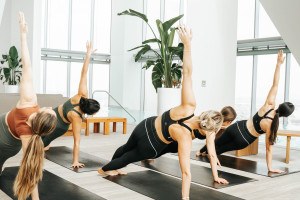Inspiration: “What I Learned from My First Triathlon”
When Be Well reader Keli Engleson—better known to some of you, perhaps, as Yoga Peach—emailed me to ask if she could share her story of how she conquered her first triathlon, the Nation’s Triathlon in D.C., I was eager to hear it. For one, I think more and more of us are becoming interested in triathlons, as marathon running continues to swell in popularity and many people with a “been there, done that” mentality are starting to seek out new challenges. But I also thought it was interesting because what I knew of Keli, mainly through our messages on Be Well Philly’s Facebook page, is that she’s not a runner. Like, at all. Yoga is her thing, so I wanted to hear how she not only turned herself into a running maven, but also tackled swimming and biking to boot.
Here’s Keli’s story, in her own words.
You haven’t always been a runner, right? What made you want to lace up?
I’ve been active and interested in fitness since my teen years but I never ran until February of this year. I thought I hated it. After making a decision to pursue training for my first triathlon, I had no choice but to overcome my running challenges. I remember when at first I could barely run a mile or two without stopping. I was determined to push through the struggle and within a couple weeks I noticed progress. I ran my first half marathon six weeks later. Positive mindset was key and reminding myself that if I could run a half marathon then I was capable of pushing through the run in the triathlon.
What made you want to do a triathlon? Did you have a goal in mind at the outset?
Fourteen months ago while talking with a triathlete, I remember saying to him, “I could never do that.” I went home that evening saying to myself, “Wait a minute, can I?” The idea of a new physical challenge intrigued me. Pushing my mind and physical limits teaches me to be comfortable being temporarily uncomfortable. In some ways I find my athletic experiences reflect my life experiences. Physical challenges strengthen me more than just physically. They encourage focus, goal setting, mental growth and confidence. I began to imagine that the energy that comes with a huge race like a triathlon would be extraordinary. My goal was simply to stay dedicated to training and cross that finish line before before the course cut off. Sometimes I put a lot of pressure on myself, and while doing my best is important to me I really wanted to make sure I enjoyed my first triathlon experience.
What was training like? Was it similar to anything else you’ve ever trained for? And what was the hardest or most challenging part?
Training required a lot of discipline, which is the fuel of achievement. It required motivation, dedication, positive mindset and focus. In the beginning, accepting that I wasn’t going to be the fastest runner in my running group challenged me. Once I was in a consistent training pattern, I really looked forward to most training days along with the energy that the workouts provided. Sometimes, it even seemed like rest days challenged me more than training days. It was important to remind myself that over-training can be as harmful as under-training.
Which event was your favorite and least favorite to train for?
Can you guess what my least favorite was? That’s easy: running. I put the least amount of training time into swimming, but I think it was my strongest of the three sports. I really enjoyed cycling, too. The excitement and the rush of energy while I envisioned crossing the finish line motivated me to keep going.
How did you manage to find the time to train for three events? Where did you train?
When I began training, I joined the run club at The Sporting Club at the Bellevue. I ran with a great group of people twice a week at 6 a.m. Eventually I started running on my own midday. I usually ran through Independence Hall and over Ben Franklin Bridge or to the Philadelphia Museum of Art. I did most of my cycling training and all of my swims at The Sporting Club. Keeping up with a regular yoga practice at times was challenging but essential for my mind and body. Finding time isn’t as hard as most people think. You could wake up earlier and if you have time to spend online or watch TV, you have time to train. All it takes is patience and willpower. If you want really something it becomes a priority and you will make the time for it.
Triathlons—and all the gear that goes into them—seem expensive. Is that a fair perception?
Yes, it’s fair. While it is one of the more expensive sports, you do not need the most expensive gear to get started. I invested as little as possible. I knew that if I enjoyed the sport I would start acquiring and upgrading gear for the next race. Races can cost up to $600 to enter and people can spend $3,000+ on the bike. I got away with a barely used road bike for $400. Here’s a breakdown of what I spent:
Race: $202
Hotel accommodations: $215
USA Triathlon one-day membership (if you are not an annual member, a one day membership is required): $12
Triathlon suit-two piece (I waited until the tri expo and got mine half price): $75
Race goggles: $30
Road bike, used Fuji in “like new” condition: $400
Helmet: $40
Bike seat cushion: $15
Water bottle cage: $10
Bike pouch: $15
Bike repair kit: $25
Running shoes: $120
Sport socks: $15
Sunglasses: $25
Gym membership: $420 for four months
Plus: transition bag, towel, Vitamin water, Advocare Rehydrate Gel, KIND bar, ripe banana.
Total investment: $1,619
Did you adjust your diet during training? Did you find yourself needing new kinds of food to stay fueled?
I didn’t adjust my diet too much during training. For the most part I already followed a nutritious diet, which included a balance of protein, carbohydrates, healthy fats and little sugar. There were times while training that I had to increase the amount of calories I consumed. That was an adjustment and took some experimenting. And there were definitely foods that I felt drawn to after hard training days. Pineapple and bananas were some of my favorites. Natural peanut butter usually went into my banana smoothies, and I also found myself eating peanut butter by the spoonful straight out of the jar. Natural peanut butter and raw nuts in moderation are an excellent source of Omega-3 fatty acid, protein, potassium, magnesium and other vitamins and minerals. I also ate fish once or twice a week and consumed lots of fruits and veggies. Oh, and my absolute favorite? Bagels! I love, love, love bagels and looked forward to eating a bagel nearly every week. I cut out alcohol about two months before the race, which wasn’t too hard since I don’t drink much, anyway. There’s no serious logic behind it, it’s just my own rule I made up and works for me.
Did you run the race solo or with a friend or team?
I trained and ran the race on my own. People knew I was training for a triathlon, but I didn’t tell anyone which race I was aiming for. I wanted to ensure no added pressure or comments would get in the way of my mindset. Taking on an Olympic triathlon (nearly one-mile swim, 25-mile bike ride, and 6.2-mile run) was a big goal for me, and I understood that a strong mindset was as important as training for the race. I enjoyed the entire process going with the flow and learning as I went. This month I joined the Philadelphia Triathlon Club and look forward to training and possibly doing my next triathlon with new tri friends.
What was the best part of the race for you?
The thrill of hearing the horn blow as the race began, the reward of crossing the finish line, and everything in between.
What was the hardest part, mentally?
A triathlon is very much a physical and mental sport. Once I was in the race and my adrenaline was pumping, I was determined to do it. After the swim and bike, I made it just to the second mile of the run before I debated walking. I asked myself to determine whether I felt pain or discomfort before stopping. It was just a brief struggle. A friend who’s inspired me a great deal this year came to mind at that moment and that’s when I decided to finish the race without stopping. Seeing the finish line from the last half mile was probably the hardest part. Seriously, it seemed like that last half mile took forever and realizing that I had nearly accomplished it was overwhelming.
What’s your advice to anyone thinking about doing a triathlon?
Stop thinking about it and start training. Trust that your mind and body can do this. This is true for any physical challenge. Focus on the goal, get your mindset right and you’ll have what it takes to succeed. Take advice that speaks to you and leave the rest behind. When you tell people you’re training for your first triathlon, you’ll receive a lot of advice you haven’t asked for. You’ll even receive advice from people who’ve never done triathlons. Everyone has different strengths and weaknesses, so don’t allow people’s comments to bring up moments of self-doubt or anxiety.
Most important, embrace your novice-ness. Enjoy the learning curve. You only have one first triathlon, so don’t compare yourself to other triathletes. Compare yourself only to the person you were yesterday. Triathlons are like nothing you’ve ever done before. You’re going to love it.


